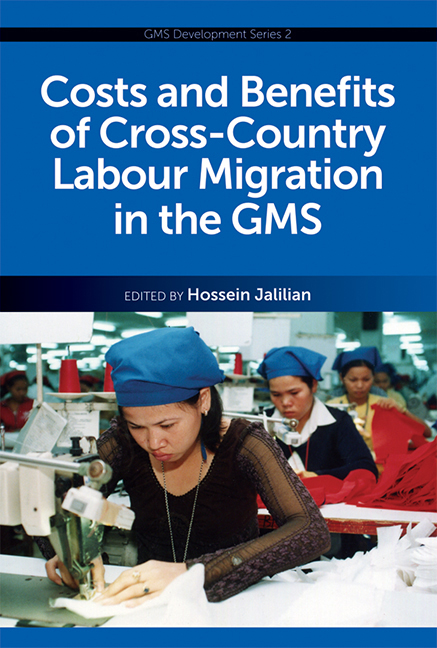Book contents
- Frontmatter
- Contents
- Acronyms and Abbreviations
- List of Figures, Tables and Boxes
- List of Contributors
- 1 Migrants of the Mekong: Wins and Losses
- 2 Economic Costs and Benefits of Labour Migration: Case of Cambodia
- 3 Economic Costs and Benefits of Labour Migration: Case of Lao PDR
- 4 Economic Costs and Benefits of Labour Migration: Case of Thailand
- 5 Economic Costs and Benefits of Labour Migration: Case of Vietnam
- 6 Migrants of the Mekong: Lessons
- Index
2 - Economic Costs and Benefits of Labour Migration: Case of Cambodia
Published online by Cambridge University Press: 21 October 2015
- Frontmatter
- Contents
- Acronyms and Abbreviations
- List of Figures, Tables and Boxes
- List of Contributors
- 1 Migrants of the Mekong: Wins and Losses
- 2 Economic Costs and Benefits of Labour Migration: Case of Cambodia
- 3 Economic Costs and Benefits of Labour Migration: Case of Lao PDR
- 4 Economic Costs and Benefits of Labour Migration: Case of Thailand
- 5 Economic Costs and Benefits of Labour Migration: Case of Vietnam
- 6 Migrants of the Mekong: Lessons
- Index
Summary
INTRODUCTION
Cambodia is a relative latecomer in terms of cross-border labour migration. Most outmigrants travel by illegal or informal means, mostly to Thailand, while the legal option is relatively new, costly, and inconvenient for most. Related government agencies face the increasing challenge of managing labour emigration, which is expected to rise due to both internal and external factors. Since the creation of productive jobs does not keep pace with the annual addition to the labour force of some 250,000, especially given the economic downturn in 2009, the emigration pressure is likely to increase. Higher wages in destination countries such as Thailand, Malaysia, Korea, Japan, and Singapore, are also a pull factor. From 1998 to the end of 2008, about 25,000 workers were officially sent overseas, according to the official statistics of the Ministry of Labour and Vocational Training (MoLVT). However, approximately 180,000 Cambodian workers were in Thailand, many of whom were undocumented (IOM 2006). Thus, Cambodia's labour migration to Thailand deserves a closer look.
While it is generally preferable to create jobs and development in the country, it is advisable to have sound management of labour emigration to reduce the risks and costs and maximize benefits for migrants. If well managed, labour migration provides considerable employment and income not only in the short and medium terms, but also in the long term in the case of many countries in the region. Labour outmigration can contribute to poverty alleviation. Remittances to Cambodia, which likely include nonmigrant remittances, were estimated at US$200 million or 3.23 per cent of GDP in 2005. By way of comparison, in the same year, Thailand received remittances of US$1.2 billion, Vietnam, US$4 billion, the Philippines, US$13.5 billion, and Bangladesh, US$4.2 billion (WB WDI 2007).
Based on a review of secondary data, reports and interviews with officials (both in Cambodia and Thailand), this study provides a brief overview of the trends and major issues of Cambodian labour migration. However, as part of the regional study, the main focus of the study is to assess the financial costs and benefits at both the individual migrant and household levels.
- Type
- Chapter
- Information
- Costs and Benefits of Cross-Country Labour Migration in the GMS , pp. 118 - 189Publisher: ISEAS–Yusof Ishak InstitutePrint publication year: 2012



